#asset management in salesforce
Explore tagged Tumblr posts
Text

Customer service and customer experience are the two eyes of a digital economy. In current times, every business be it small or medium or large are a part of this economy.
Customers always expect outstanding service and a brilliant experience from customer service agents of an organization. Customer retention, loyalty, trust, growth and more benefits are the rewards of managing customer service effectively.
What is asset management?
Asset management is one of the modules of the Salesforce service cloud, which helps in managing information relating to the product that the organization sells, assets represent the products customers have purchased.
The asset management module can be used to store complete information about purchased products.
Salesforce Service Cloud helps organizations provide top-notch customer service. Asset management is a key component of the service cloud, helping customer service agents validate the products or services purchased by the customers. There by making it seamless for Customer service agents to provide validated information to customers.
Role of Asset Management
Salesforce service cloud helps customer service agents to see and manage both products purchased by customers and company inventory or Stocks. . It allows tracking of products that are owned by customers. Asset management is a place where customer service agents can get complete details about a particular product.
Salesforce service cloud asset management can be associated or linked to entitlements, work orders, maintenance plans, and more. This asset management helps customer service agents quickly access the view and history of a product owned by a customer.
#asset management#asset management system#asset management in salesforce#asset management in salesforce service cloud#asset management benefits#customer service agents
0 notes
Link
Explore the technologies enhancing Financial Services and BFSI sector including the Financial Services cloud. Features including account administration, financial planning tools, portfolio management, and compliance monitoring are available in the Salesforce Financial Services Cloud. To offer a complete solution for financial institutions, it also interfaces with other Salesforce products like Marketing Cloud and Sales Cloud.
#salesforce wealth management#Financial Services Cloud#Financial Services Cloud Trends#Salesforce Financial Services Cloud#Future Technolgy#Financial Services#Technolgy Trends#Artificial intelligence#Low-Code#No-Code#Low-Code Solutions#No-Code Solutions#Financial institutions#NBFCs#Assets management#Cloud implementation#Cloud-based infrastructure#Technology Adaptation#AWS financial services#Financial cloud salesforce#Cloud financial services#Salesforce for financial advisors#Financial cloud computing#Cloud based financial services#Salesforce finance#Salesforce FSC
2 notes
·
View notes
Text
How Salesforce Service Cloud Puts Forward a Customer-First Approach
In today’s competitive business landscape, where customer expectations are evolving rapidly, delivering exceptional customer experiences is more crucial than ever. A customer-first approach is no longer just a strategy but a necessity for businesses aiming to thrive. Salesforce Service Cloud, a powerful and leading customer service platform, is designed to help companies prioritize customer needs, ensuring personalized and efficient service. Let’s dive into how Salesforce Service Cloud empowers organizations to adopt a customer-centric approach, highlighting its key features and benefits.
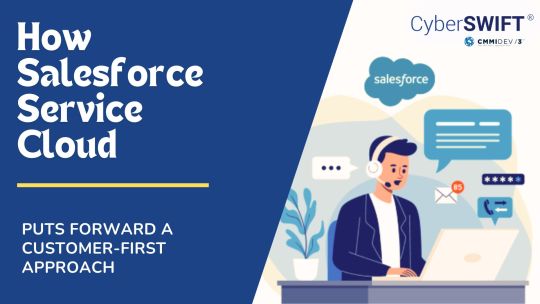
#salesforce development service#salesforce app development#salesforce development companies#offshore salesforce development#sales force development#salesforce application development#salesforce mobile app development#salesforce custom development#salesforce development consulting#salesforce development agency india#salesforce development company kolkata#salesforce integration services#salesforce service cloud#salesforce inventory management#salesforce asset management
0 notes
Text
UTI AMC Collaborates with Salesforce to Enhance Customer Engagement.
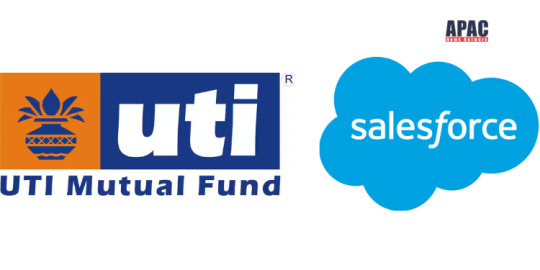
Bengaluru: UTI Asset Management Company Limited (UTI AMC) has announced a collaboration with Salesforce to streamline customer engagement and enhance operational efficiency. This partnership aims to transform customer interactions through trust, transparency, and personalized service.
ALSO READ MORE- https://apacnewsnetwork.com/2024/07/uti-amc-collaborates-with-salesforce-to-enhance-customer-engagement/
#Salesforce#Salesforce to Enhance Customer Engagement#Salesforce’s Data Cloud#UTI AMC#UTI AMC with AI capabilities#UTI Asset Management Company Limited
0 notes
Text
Master Your Digital Assets with Top Digital Asset Management Solutions
Find the perfect digital asset management solution to organize, search, and share your media effortlessly. Streamline your workflow and optimize content control for maximum efficiency.
#Digital Asset Management#snowflake developers#servicenow#company for digital marketing#salesforce consultants#best digital marketing company india#business consulting firm#website redesign#saphana#digital transformation
1 note
·
View note
Text
2024 team sponsors recap!
this is completely irrelevant to F1 but i study and do these stuffs for a living sooo 😩😩 2023 sponsors are based on the sponsors that are there at the beginning of the season (new sponsors that join in the middle of the season will be classified as 2024's)
Mercedes AMG Petronas F1 Team:
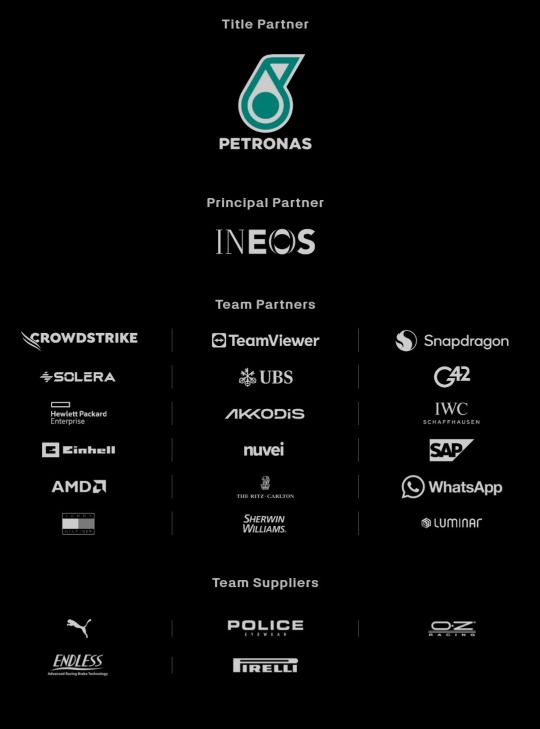
New sponsors: Whatsapp, Luminar (American tech company), SAP (German software company), nuvei (Canadian credit card services), Sherwin Williams (American painting company) 2024 data last update: 2024/02/14
Old sponsors that left: Monster Energy, Pure Storage (American technology company), fastly (American cloud computing services), Axalta (American painting company), Eight sleep (American mattresses company) 2023 data last update: 2023/01/07
Oracle Red Bull Racing F1 Team:
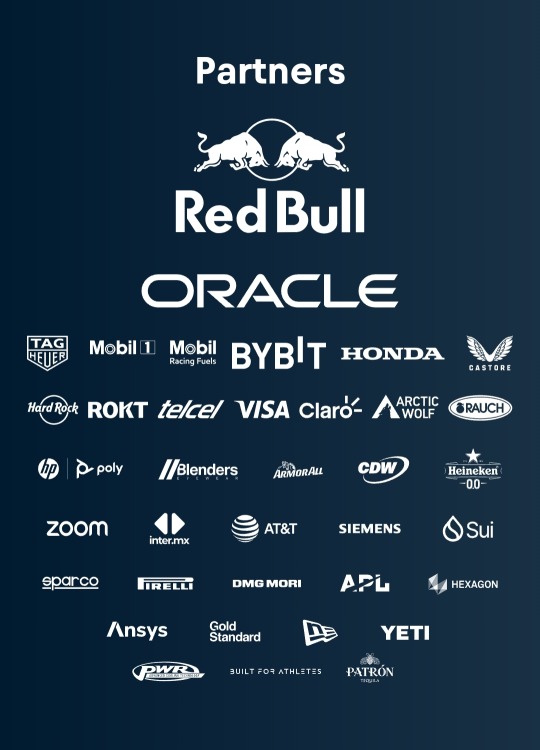
New sponsors: Yeti (American cooler manufacturer, joined later in 2023), APL (American footwear/athletic apparel manufacturer, joined later in 2023), CDW (American IT company, joined later in 2023), Sui (American tech app by Mysten Labs, joined later in 2023), Patron Tequila (Mexican alcoholic beverages company, joined later in 2023) 2024 data last update: 2024/02/15
Old sponsors that left: CashApp, Walmart, Therabody (American wellness technology company), Ocean Bottle (Norwegian reusable bottle manufacturer), PokerStars (Costa Rican gambling site), Alpha Tauri (? no info if they're official partners or not but Austrian clothing company made by Red Bull), BMC (Switzerland bicycle/cycling manufacturer), Esso (American fuel company, subsidiary of ExxonMobil), Hewlett Packard Enterprise (American technology company) 2023 data last update: 2023/03/07
More: Esso is a subsidiary of Mobil so there's possibility they merged or something
Scuderia Ferrari:

New sponsors: VGW Play (Australian tech game company, joined later in 2023), DXC Technology (American IT company, joined later in 2023), Peroni (Italian brewing company), Z Capital Group/ZCG (American private asset management/merchant bank company), Celsius (Swedish energy drink manufacturer) 2024 data last update: 2024/02/15
Old sponsors that left: Mission Winnow (American content lab by Phillip Morris International aka Marlboro), Estrella Garcia (Spanish alcoholic beverages manufacturer), Frecciarossa (Italian high speed train company) 2023 data last update: 2023/02/16
More: Mission Winnow is a part of Phillip Morris International. They are no longer listed as team sponsor but PMI is listed instead.
(starting here, 2023 data last update is 2023/02/23 and 2024 data last update is 2024/02/15)
McLaren F1 Team: (Only McLaren RACING's data is available idk if some of these are XE/FE team partners but anw..)
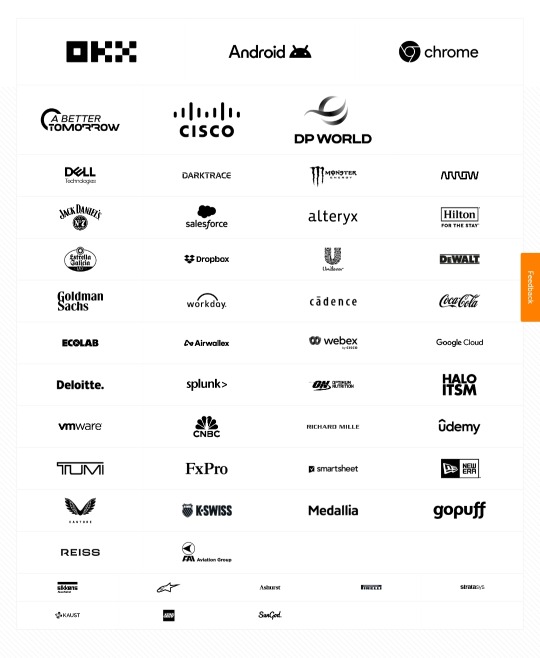
New sponsors: Monster Energy, Salesforce (American cloud based software company, joined later in 2023), Estrella Garcia (Spanish alcoholic beverages manufacturer), Dropbox (American file hosting company), Workday (American system software company, joined later in 2023), Ecolab (American water purification/hygiene company), Airwallex (Australian financial tech company), Optimum Nutrition (American nutritional supplement manufacturer), Halo ITSM (American software company, joined later in 2023), Udemy (American educational tech company, joined later in 2023), New Era (American cap manufacturer, joined in 2023), K-Swiss (American shoes manufacturer, joined later in 2023), Alpinestars (Italian motorsports safety equipment manufacturer)
Old sponsors that left: DP World (Emirati logistics company), EasyPost (American shipping API company), Immersive Labs (UK cybersecurity training company?), Logitech, Mind (UK mental health charity), PartyCasino (UK? online casino site), PartyPoker (American? gambling site), Sparco (Italian auto part & accessory manufacturer), Tezos (Switzerland crypto company)
Aston Martin Aramco F1 Team:

New sponsors: Valvoline (American retail automotives service company, joined later in 2023), NexGen (Canadian sustainable? fuel company), Banco Master (Brazilian digital banking platform, joined later in 2023), ServiceNow (American software company, joined later in 2023), Regent Seven Seas Cruise, Wolfgang Puck (Austrian-American chef and restaurant owner, joined later in 2023), Financial Times (British business newspaper), OMP (Italian racing safety equipment manufacturer), stichd (Netherlands fashion & apparel manufacturer)
Old sponsors that left: Alpinestars (Italian motorsports safety equipment manufacturer), crypto.com (Singaporean cryptocurrency company), ebb3 (UK? software company), Pelmark (UK fashion and apparel manufacturer), Peroni (Italian brewing company), Porto Seguro (Brazilian insurance company), Socios (Malta's blockchain-based platform), XP (Brazilian investment company)
Stake F1 Team (prev. Alfa Romeo):
???? Can't found their website (might be geoblocked in my country???)
BWT Alpine F1 Team:

New sponsors: MNTN (American software company), H. Moser & Cie (Switzerland watch manufacturer), Amazon Music
Old sponsors that left: Bell & Ross (French watch company), Ecowatt (??? afaik French less-energy smthn smthn company), Elysium (French? American? Software company), KX (UK software company), Plug (American electrical equipment manufacturing company)
Visa CashApp RB F1 Team (prev. Scuderia Alpha Tauri):

New Sponsors: Visa, CashApp, Hugo Boss, Tudor, Neft Vodka (Austrian alcoholic beverages company), Piquadro (Italian luxury bag manufacturer)
Old sponsors that left: Buzz (?), Carl Friedrik (UK travel goods manufacturer), Flex Box (Hongkong? shipping containers manufacturer), GMG (Emirati global wellbeing company), RapidAPI (American API company)
Haas F1 Team:

New sponsors: New Era (American cap manufacturer, joined later in 2023)
Old sponsors that left: Hantec Markets (Hongkong capital markets company), OpenSea (American NFT/Crypto company)
Williams Racing:


New sponsors: Komatsu, MyProtein (British bodybuilding supplement), Kraken (American crypto company, joined later in 2023), VAST Data (American tech company), Ingenuity Commerce (UK e-commerce platform), Puma (joined later in 2023)
Old sponsors that left: Acronis (Swiss software company), Bremont (British watch manufacturer), Dtex Systems (American? cybersecurity company), Financial Times (British business newspaper), Jumeirah Hotels & Resorts, KX (UK software company), OMP (Italian racing safety equipment manufacturer), PPG (American painting manufacturer), Umbro (English sports equipment manufacturer), Zeiss (German opticals/optometrics manufacturing company)
#mercedes amg petronas#red bull racing#scuderia ferrari#visa cash app rb#haas f1 team#mclaren f1#aston martin#alpine f1#williams racing#stake f1 team#f1#ari's rant#sponsor talks
42 notes
·
View notes
Text
Generative AI in Financial Services Market Scope, Share, and Industry Forecast 2032
The Generative AI In Financial Services Market was valued at USD 2.1 Billion in 2023 and is expected to reach USD 358.4 Billion by 2032, growing at a CAGR of 39.80% from 2024-2032.
Generative AI in Financial Services Market: Transforming the Landscape The financial services industry is undergoing a technological revolution, with generative artificial intelligence (AI) at the forefront of innovation. This emerging technology is reshaping how banks, insurance firms, asset managers, and fintech companies operate, enabling smarter decision-making, enhanced customer experiences, and operational efficiency. By leveraging deep learning models capable of generating human-like content, institutions are automating complex processes—from fraud detection and risk modeling to personalized financial advisory services.
Generative AI in Financial Services Market: Transforming the Landscape With rapid advancements in machine learning and natural language processing, generative AI is now being applied to critical financial functions such as algorithmic trading, credit scoring, and compliance monitoring. The integration of generative models helps organizations uncover new revenue streams, reduce costs, and remain agile in a highly regulated environment. As customer demands evolve and data becomes more complex, the ability to interpret, generate, and act on information swiftly is proving to be a game-changer for financial institutions.
Get Sample Copy of This Report: https://www.snsinsider.com/sample-request/5957
Market Keyplayers:
IBM Corporation – Watsonx
Microsoft Corporation – Azure OpenAI Service
Google LLC – Vertex AI
Amazon Web Services (AWS) – Amazon Bedrock
OpenAI – ChatGPT Enterprise
Salesforce, Inc. – Einstein GPT
Nvidia Corporation – NeMo Framework
SAP SE – SAP Business AI
Oracle Corporation – Oracle AI
FIS (Fidelity National Information Services, Inc.) – FIS Code Connect AI
Intuit Inc. – Intuit Assist
Mastercard Incorporated – AI-Powered Cybersecurity & Fraud Detection
Visa Inc. – AI-driven Risk & Fraud Management
JPMorgan Chase & Co. – IndexGPT
Ernst & Young (EY) – EY.ai
Market Analysis
The global market for generative AI in financial services is witnessing strong growth, driven by rising investments in AI technology, the digital transformation of financial operations, and the demand for advanced analytics. North America currently holds the largest market share, while Asia-Pacific is emerging as the fastest-growing region due to increased fintech adoption and favorable government initiatives. Major industry players are collaborating with AI startups and research institutions to gain a competitive edge.
Scope
Generative AI has wide-ranging applications across the financial ecosystem. It supports real-time decision-making, enables hyper-personalization of services, streamlines regulatory reporting, and automates content generation for customer communications. The technology also enhances cybersecurity measures by identifying patterns and anomalies faster than traditional systems.
Key Trends
Rise in AI-Powered Risk Management Tools – Enhanced predictive capabilities are helping firms manage credit, market, and operational risks more effectively.
Personalized Customer Engagement – AI is enabling tailored advice and financial products based on individual behavior and preferences.
Integration with Blockchain – Combining generative AI with distributed ledger technology to improve transaction transparency and automation.
AI-Driven Compliance and Regulatory Reporting – Automating compliance workflows and minimizing human errors in reporting.
Voice-Enabled Financial Assistants – Intelligent chatbots and voice agents are redefining customer service in banking and wealth management.
Investment in AI Talent and Infrastructure – Organizations are building internal AI teams and investing in cloud-based infrastructure to scale their capabilities.
Future Prospects
The outlook for generative AI in financial services remains highly optimistic. As technology matures and becomes more accessible, its applications will expand beyond current use cases, enabling institutions to unlock deeper insights, accelerate innovation, and build resilient digital infrastructures. Ethical and transparent deployment will be key to long-term success, with a focus on responsible AI practices and regulatory compliance.
Access Complete Report: https://www.snsinsider.com/reports/generative-ai-in-financial-services-market-5957
Conclusion
Generative AI is not just an emerging technology—it is a strategic asset that is redefining the future of finance. With its transformative potential, it offers unparalleled opportunities for innovation, efficiency, and growth. As financial institutions continue to adapt and evolve, those that embrace generative AI today will be best positioned to lead tomorrow
About Us:
SNS Insider is one of the leading market research and consulting agencies that dominates the market research industry globally. Our company's aim is to give clients the knowledge they require in order to function in changing circumstances. In order to give you current, accurate market data, consumer insights, and opinions so that you can make decisions with confidence, we employ a variety of techniques, including surveys, video talks, and focus groups around the world.
Contact Us:
Jagney Dave - Vice President of Client Engagement
Phone: +1-315 636 4242 (US) | +44- 20 3290 5010 (UK)
#Generative AI in Financial Services Market#Generative AI in Financial Services Market Scope#Generative AI in Financial Services Market Growth#Generative AI in Financial Services Market Trends
0 notes
Text
What Does a Salesforce Admin Do? A Beginner’s Guide to Unlocking Business Success

A Salesforce Admin plays a crucial role in optimizing business operations by managing and customizing the Salesforce platform to meet organizational needs. They act as the bridge between business users and technology, ensuring that CRM tools are user-friendly, efficient, and aligned with business goals.
From managing user accounts and setting up dashboards to automating workflows and ensuring data security, a Salesforce Admin helps streamline processes and boost productivity. In today’s digital-first environment, businesses rely heavily on CRM optimization, sales automation, and data-driven decision-making — all areas where a skilled Salesforce Admin adds tremendous value.
Whether it's lead management, report generation, or app integration, a Salesforce Admin ensures everything runs smoothly, making them an essential asset for companies looking to scale efficiently with customer success at the core.
0 notes
Text
What Does a Salesforce Admin Do? A Beginner’s Guide to Unlocking Business Success

A Salesforce Admin plays a crucial role in optimizing business operations by managing and customizing the Salesforce platform to meet organizational needs. They act as the bridge between business users and technology, ensuring that CRM tools are user-friendly, efficient, and aligned with business goals.
From managing user accounts and setting up dashboards to automating workflows and ensuring data security, a Salesforce Admin helps streamline processes and boost productivity. In today’s digital-first environment, businesses rely heavily on CRM optimization, sales automation, and data-driven decision-making — all areas where a skilled Salesforce Admin adds tremendous value.
Whether it's lead management, report generation, or app integration, a Salesforce Admin ensures everything runs smoothly, making them an essential asset for companies looking to scale efficiently with customer success at the core.
0 notes
Text
Field Service Management Apps: Efficiency with FieldEZ’s Smart Solutions
In today’s fast-paced digital age, businesses with field operations are turning to technology to manage tasks more efficiently, reduce manual errors, and enhance customer satisfaction. One powerful tool at their disposal is field service management software. Designed to simplify complex workflows and boost productivity, these apps are becoming indispensable for organizations in service, sales, and retail industries.
What are Field Service Management Apps?
Field service management (FSM) apps are digital platforms that help companies manage off-site operations such as installations, repairs, sales visits, and routine services. These apps handle everything from technician scheduling and dispatching to inventory control and customer communication, all from a central system.
Fieldez Technologies stands out in this domain with its innovative suite of field service management apps, including ServiceEz, SalesEz, and RetailEz. Each is tailored to meet the unique needs of specific field operations, empowering teams with real-time updates, seamless workflow automation, and intuitive dashboards.
1. ServiceEz: Optimizing Service Teams with Intelligence
ServiceEz is Fieldez’s flagship offering designed for businesses that rely on service technicians and maintenance teams. With this powerful field service management software, organizations can schedule jobs with precision, assign the right technician based on skills and location, and monitor job progress in real-time.
Key features of ServiceEz include:
Smart scheduling and dispatch
Mobile access for on-the-go updates
Real-time notifications
Asset and inventory tracking
Seamless customer interaction
By incorporating workflow automation, ServiceEz reduces paperwork and delays, allowing teams to focus on delivering excellent service instead of administrative tasks.
2. SalesEz: Supercharging Field Sales Teams
For companies with mobile salesforces, SalesEz provides a comprehensive platform to track leads, manage territories, and close deals faster. This FSM app helps sales teams stay productive and informed while on the move.
SalesEz offers:
Geo-tracking and route optimization
Sales performance analytics
Lead and opportunity management
Integration with CRM tools
Expense and time tracking
The workflow automation built into SalesEz ensures that sales reps spend less time on repetitive admin tasks and more time engaging with customers and driving revenue.
3. RetailEz: Driving Efficiency in Field Retail Operations
Retail businesses that operate across multiple locations or require in-store promotional activities can benefit from RetailEz. This tool helps brands ensure compliance, track stock movement, and execute campaigns with precision.
RetailEz’s features include:
Retail audit checklists
Real-time stock visibility
Promotional activity tracking
GPS-enabled visit verification
Feedback and reporting tools
With RetailEz, field retail teams can execute faster, more consistent in-store experiences, contributing to better customer engagement and sales performance.
The Power of Workflow Automation:
One of the biggest advantages of using field service management software from Fieldez is the built-in workflow automation. Whether it’s automatically assigning tasks, triggering alerts based on job status, or generating performance reports, automation reduces human error and boosts operational efficiency.
This not only saves time but also provides leadership with valuable insights for continuous improvement. It streamlines every stage of fieldwork — from planning and execution to follow-up — ensuring smoother coordination across teams.
Final Thoughts:
In an increasingly mobile world, businesses cannot afford to let outdated systems slow them down. Field service management apps like ServiceEz, SalesEz, and RetailEz from Fieldez empower companies to take control of their field operations with cutting-edge features and robust workflow automation.
Whether you’re running a service-based business, managing a mobile salesforce, or overseeing retail audits, investing in the right field service management software can significantly enhance productivity, customer satisfaction, and overall growth.
If your goal is operational excellence and smarter workforce management, it’s time to explore the possibilities with Fieldez’s intelligent solutions.
#field service#fieldez#services#apps#management software#field management#field service software#field force management
0 notes
Text
CRM Coding: Building Smarter Customer Relationship Solutions
In today’s business landscape, customer relationships are more than just interactions—they're strategic assets. As companies strive to create meaningful and lasting connections with their audiences, they often turn to CRM systems to manage communication, data, and workflows. But for a CRM (Customer Relationship Management) system to truly reflect a company’s unique operations, it needs more than just setup—it needs smart, effective CRM coding.
CRM coding is the technical backbone behind customized CRM solutions. It involves writing code to tailor the functionality of a CRM platform, create new features, integrate third-party applications, and automate business processes. In essence, CRM coding transforms off-the-shelf CRM tools into powerful, personalized engines for business growth.
What Is CRM Coding?
CRM coding is the process of writing scripts, modules, and integrations that enhance the capabilities of a CRM system. Whether a business is using Salesforce, Zoho, HubSpot, or building a custom CRM from scratch, coding enables developers to make the system perform exactly as needed.
Some of the most common areas of CRM coding include:
Custom Fields and Workflows: Automating data entry, lead tracking, or task assignments.
API Integrations: Connecting the CRM with tools like email platforms, analytics, or payment gateways.
Custom Dashboards: Displaying real-time data in a user-friendly way.
Data Validation Scripts: Ensuring that entries are accurate and consistent.
Security and Role Management: Controlling access based on user roles and permissions.
CRM coding ensures that the software doesn’t just work—it works for you.
Why CRM Coding Is Important for Businesses
Many CRM systems come with great built-in features, but they aren’t always tailored to specific industries or business models. Without proper customization, businesses may face limitations that prevent them from fully leveraging their CRM investment.
Here’s why CRM coding makes a difference:
Improves Efficiency: By automating tasks and workflows, teams save time and reduce manual errors.
Boosts Team Collaboration: Integrated systems allow for smoother information sharing across departments.
Enhances Customer Service: Quick access to detailed customer data means better, more personalized support.
Supports Growth: As businesses evolve, CRM coding allows the system to grow with them.
Increases ROI: A customized CRM aligns better with business goals, improving its overall value.
The Role of Developers in CRM Coding
Behind every well-functioning CRM system is a skilled developer—or a team of them. These professionals understand not only the coding languages involved but also the business logic behind the software.
CRM developers typically work with:
JavaScript for front-end customizations and browser-side scripting
PHP, Python, or Java for back-end logic
SQL for database management and queries
APIs and Webhooks for real-time data synchronization between systems
A successful CRM coding project requires both technical expertise and a clear understanding of the client’s workflows, goals, and customer journey.
Partnering with the Right Development Team
If you’re planning to build or customize a CRM system, finding a reliable development partner is essential. One example of a trusted source for custom CRM development is codingcafe.website. Their team offers tailored CRM solutions, working closely with clients to ensure that every line of code adds value to the business.
From designing custom modules to integrating third-party tools, Coding Cafe focuses on creating CRM systems that are efficient, intuitive, and scalable. Whether you’re building a CRM from scratch or enhancing an existing platform, their approach prioritizes performance, usability, and long-term flexibility.
Looking Ahead: The Future of CRM Coding
As technology evolves, CRM coding is becoming more dynamic. Artificial intelligence, machine learning, and predictive analytics are now being woven into CRM platforms, offering deeper insights and automation. For businesses to stay competitive, adapting their CRM systems to embrace these innovations is becoming increasingly important.
Custom coding ensures that your CRM isn't just reactive—it becomes proactive, offering suggestions, automating decisions, and delivering a smarter experience for both teams and customers.
Final Thoughts
CRM coding is more than a technical process—it's a way to align technology with human connection. A well-coded CRM system supports the unique needs of your business, empowers your team, and builds stronger relationships with your customers.
If you’re ready to take your CRM to the next level, working with experienced developers like those at codingcafe.website can help you create a system that works smarter, not harder.
0 notes
Text
How U.S. Startups Are Leveraging Free CRM Tools to Drive Customer Engagement Without Breaking the Bank?

Free CRM tools have been a necessity for large-scale companies. Improving sales, bringing in higher customer engagement rates, & escalating growth are some of the crucial components of it. For the startups, every minute & every investment counts. Tools to keep track of the growing number of contacts, nurture leads, & track customer interactions are imperative. These free CRM tools are also used in identifying target audiences and launching marketing campaigns.
The Democratization of CRM
Customer Relationship Management (CRM) software has traditionally been the domain of large enterprises with the budgets to match. However, in recent years, platforms offering free CRM tools have democratized access to these once-exclusive systems. Companies like HubSpot, Zoho, Bitrix24, and Freshsales now offer robust free tiers that provide startups with everything from contact management and sales tracking to automated email marketing and analytics.
According to Grand View Research, the global CRM market was valued at $58.82 billion in 2022 and is expected to expand at a CAGR of 13.9% from 2023 to 2030. While a sizable portion of this market still includes enterprise-grade solutions, a growing number of startups are gravitating toward free offerings as a viable entry point.
Cost-Efficiency Meets Functionality

For cash-strapped startups, free CRM tools offer a way to stay organized and competitive. Most of these tools now come with features that were once only available in paid versions: lead scoring, sales funnel visualization, customer segmentation, and task automation. The value proposition is simple yet powerful—do more with less.
Take, for instance, HubSpot's free CRM. It offers unlimited users, 1 million contacts, and integrations with platforms like Gmail, Outlook, and Slack. This means that small teams can execute complex marketing and sales campaigns without investing in expensive software licenses.
Boosting Customer Engagement from Day One
Startups thrive on agility and innovation. Free CRM tools enhance both by streamlining communication, automating follow-ups, and enabling real-time tracking of customer interactions. This agility allows startups to craft personalized experiences that nurture leads and build loyalty from the get-go.
In a survey conducted by Salesforce, 84% of customers stated that being treated like a person, not a number, is critical to winning their business. CRM systems, even the free versions, empower startups to achieve that level of personalization without requiring a large sales team or a hefty tech stack.
Scalability for Growing Needs

One of the key concerns with free CRM tools is whether they can scale as the business grows. The good news? Most of these platforms offer seamless upgrade paths. As a startup's customer base expands and their operational complexity increases, they can transition to paid plans without migrating to a new system—ensuring continuity and reducing friction.
For example, Zoho CRM allows startups to move from a free version to its standard, professional, or enterprise tiers depending on business needs. This modularity is essential for startups aiming to future-proof their operations.
Integration with Existing Workflows
Modern free CRM tools are built to integrate with a broad array of existing applications. Whether it's syncing with e-commerce platforms like Shopify, customer support solutions like Zendesk, or project management tools like Trello, the ease of integration means startups can unify their operations within a single ecosystem.
Such integrations not only save time but also ensure that data is consistently updated across platforms, reducing errors and increasing overall efficiency. For startups juggling multiple roles and responsibilities, this can be a major asset.
Data-Driven Decision Making
In today’s digital economy, data is the currency of smart decision-making. Free CRM tools provide startups with the analytics they need to track customer behavior, identify sales bottlenecks, and fine-tune marketing strategies. Dashboards and visual reports help founders and managers make data-backed decisions without needing a dedicated analyst team.
A 2023 report by Statista revealed that 62% of U.S. businesses that use CRM tools experienced improved customer retention. This underscores the value of having data-centric systems in place—even more so when those systems are accessible at zero cost.
Community and Support Resources

Another often-overlooked advantage of using popular free CRM tools is the access to vibrant user communities and extensive support documentation. Startups can tap into forums, webinars, and how-to guides to troubleshoot issues or optimize workflows, reducing their dependence on external consultants.
In some cases, these communities even drive innovation, with users sharing hacks and workarounds that extend the functionality of the tools.
Challenges and Considerations
Of course, free CRM tools come with trade-offs. Limited features, user caps, and branding restrictions can hinder growth if not anticipated. Startups need to assess whether a tool aligns with their short-term needs and long-term vision. Data security and compliance should also be top-of-mind, especially when handling sensitive customer information.
To mitigate risks, many startups adopt a hybrid approach—leveraging free CRM functionalities while integrating them with niche paid tools to cover any gaps.
Conclusion:
For U.S.-based startups aiming to scale customer engagement without incurring massive costs, free CRM tools are proving to be an indispensable asset. They offer functionality, flexibility, and scalability—critical elements for any growing business.
In a time when agility and resourcefulness define success, leveraging free CRM tools isn’t just a budget-friendly move—it’s a strategic one. By harnessing the capabilities of these platforms, startups can build robust customer relationships, make smarter decisions, and compete more effectively in crowded markets.
As digital transformation continues to reshape the startup ecosystem, the role of free CRM tools will only become more integral. For savvy founders and C-suite leaders, now is the time to embrace these tools as foundational pillars of modern business growth.
Uncover the latest trends and insights with our articles on Visionary Vogues
0 notes
Text
IoT Analytics Market Analysis: Size, Share, Scope, Forecast Trends & Industry Report 2032
The IoT Analytics Market was valued at USD 26.90 billion in 2023 and is expected to reach USD 180.36 billion by 2032, growing at a CAGR of 23.60% from 2024-2032.
The Internet of Things (IoT) Analytics Market is witnessing exponential growth as organizations worldwide increasingly rely on connected devices and real-time data to drive decision-making. As the number of IoT-enabled devices surges across sectors like manufacturing, healthcare, retail, automotive, and smart cities, the demand for analytics solutions capable of processing massive data streams is at an all-time high. These analytics not only help in gaining actionable insights but also support predictive maintenance, enhance customer experiences, and optimize operational efficiencies.
IoT Analytics Market Size, Share, Scope, Analysis, Forecast, Growth, and Industry Report 2032 suggests that advancements in cloud computing, edge analytics, and AI integration are pushing the boundaries of what’s possible in IoT ecosystems. The ability to process and analyze data at the edge, rather than waiting for it to travel to centralized data centers, is allowing businesses to act in near real-time. This acceleration in data-driven intelligence is expected to reshape entire industries by improving responsiveness and reducing operational lags.
Get Sample Copy of This Report: https://www.snsinsider.com/sample-request/5493
Market Keyplayers:
Accenture (myConcerto, Accenture Intelligent Platform Services)
Aeris (Aeris IoT Platform, Aeris Mobility Suite)
Amazon Web Services, Inc. (AWS IoT Core, AWS IoT Analytics)
Cisco Systems, Inc. (Cisco IoT Control Center, Cisco Kinetic)
Dell Inc. (Dell Edge Gateway, Dell Technologies IoT Solutions)
Hewlett Packard Enterprise Development LP (HPE IoT Platform, HPE Aruba Networks)
Google (Google Cloud IoT, Google Cloud BigQuery)
OpenText Web (OpenText IoT Platform, OpenText AI & IoT)
Microsoft (Azure IoT Suite, Microsoft Power BI)
Oracle (Oracle IoT Cloud, Oracle Analytics Cloud)
PTC (ThingWorx, Vuforia)
Salesforce, Inc. (Salesforce IoT Cloud, Salesforce Einstein Analytics)
SAP SE (SAP Leonardo IoT, SAP HANA Cloud)
SAS Institute Inc. (SAS IoT Analytics, SAS Visual Analytics)
Software AG (Cumulocity IoT, webMethods)
Teradata (Teradata Vantage, Teradata IntelliCloud)
IBM (IBM Watson IoT, IBM Maximo)
Siemens (MindSphere, Siemens IoT 2040 Gateway)
Intel (Intel IoT Platform, Intel Analytics Zoo)
Honeywell (Honeywell IoT Platform, Honeywell Forge)
Bosch (Bosch IoT Suite, Bosch Connected Industry)
Trends Shaping the IoT Analytics Market
The evolution of the IoT analytics market is marked by key trends that highlight the sector’s transition from basic connectivity to intelligent automation and predictive capabilities. One of the most significant trends is the growing integration of Artificial Intelligence (AI) and Machine Learning (ML) into analytics platforms. These technologies enable smarter data interpretation, anomaly detection, and more accurate forecasting across various IoT environments.
Another major trend is the shift toward edge analytics, where data processing is performed closer to the source. This reduces latency and bandwidth usage, making it ideal for industries where time-sensitive data is critical—such as healthcare (real-time patient monitoring) and industrial automation (machine health monitoring). Additionally, multi-cloud and hybrid infrastructure adoption is growing as companies seek flexibility, scalability, and resilience in how they handle vast IoT data streams.
Enquiry of This Report: https://www.snsinsider.com/enquiry/5493
Market Segmentation:
By Type
Descriptive Analytics
Diagnostic Analytics
Predictive Analytics
Prescriptive Analytics
By Component
Solution
Services
By Organization Size
Small & Medium Enterprises
Large Enterprises
By Deployment
On-Premises
Cloud
By Application
Energy Management
Predictive Maintenance
Asset Management
Inventory Management
Remote Monitoring
Others
By End Use
Manufacturing
Energy & Utilities
Retail & E-commerce
Healthcare & Life Sciences
Transportation & Logistics
IT & Telecom
Market Analysis
The IoT analytics market is expected to grow significantly, driven by the proliferation of connected devices and the need for real-time data insights. According to recent forecasts, the market is projected to reach multibillion-dollar valuations by 2032, growing at a robust CAGR. Key factors contributing to this growth include the increasing use of smart sensors, 5G deployment, and a shift toward Industry 4.0 practices across manufacturing and logistics sectors.
Enterprises are rapidly adopting IoT analytics to streamline operations, reduce costs, and create new revenue streams. In sectors such as smart agriculture, analytics platforms help monitor crop health and optimize water usage. In retail, real-time customer behavior data is used to enhance shopping experiences and inventory management. Governments and municipalities are also leveraging IoT analytics for smart city applications like traffic management and energy efficiency.
Future Prospects
Looking ahead, the IoT analytics market holds vast potential as the digital transformation of industries accelerates. Innovations such as digital twins—virtual replicas of physical assets that use real-time data—will become more prevalent, enabling deeper analytics and simulation-driven decision-making. The combination of 5G, IoT, and AI will unlock new use cases in autonomous vehicles, remote healthcare, and industrial robotics, where instantaneous insights are essential.
The market is also expected to see increased regulatory focus and data governance, particularly in sectors handling sensitive information. Ensuring data privacy and security while maintaining analytics performance will be a key priority. As a result, vendors are investing in secure-by-design platforms and enhancing their compliance features to align with global data protection standards.
Moreover, the democratization of analytics tools—making advanced analytics accessible to non-technical users—is expected to grow. This shift will empower frontline workers and decision-makers with real-time dashboards and actionable insights, reducing reliance on centralized data science teams. Open-source platforms and API-driven ecosystems will also support faster integration and interoperability across various IoT frameworks.
Access Complete Report: https://www.snsinsider.com/reports/iot-analytics-market-5493
Conclusion
The IoT analytics market is positioned as a cornerstone of the digital future, with its role expanding from simple monitoring to predictive and prescriptive intelligence. As the volume, variety, and velocity of IoT data continue to increase, so does the need for scalable, secure, and intelligent analytics platforms. Companies that leverage these capabilities will gain a significant competitive edge, transforming how they operate, interact with customers, and drive innovation.
About Us:
SNS Insider is one of the leading market research and consulting agencies that dominates the market research industry globally. Our company's aim is to give clients the knowledge they require in order to function in changing circumstances. In order to give you current, accurate market data, consumer insights, and opinions so that you can make decisions with confidence, we employ a variety of techniques, including surveys, video talks, and focus groups around the world.
Contact Us:
Jagney Dave - Vice President of Client Engagement
Phone: +1-315 636 4242 (US) | +44- 20 3290 5010 (UK)
0 notes
Text
Revolutionizing Data Visualization: The Power of ST Product Bank’s Graph Generator
In today’s data-driven world, the ability to quickly interpret and present complex information is vital for businesses, educators, and analysts alike. ST Product Bank’s Graph Generator emerges as a groundbreaking tool designed to simplify the way we handle data visualization. Tailored for professionals across various industries, this innovative tool enables users to convert raw data into visually engaging and interactive graphs with ease and precision.
At its core, the Graph Generator is built with user-friendliness and versatility in mind. Whether the data is stored in spreadsheets, databases, or manually inputted, the tool supports multiple data sources and formats, making it highly accessible to users with different levels of technical expertise. Its intuitive interface allows users to drag and drop data sets, choose from a variety of chart types—including line, bar, pie, scatter, and area graphs—and customize the appearance according to brand or presentation needs.
One of the standout features of ST Product Bank’s Graph Generator is its real-time collaboration functionality. Teams can work together remotely on the same graph, share feedback, and make live edits, which significantly improves productivity and streamlines decision-making processes. This collaborative environment is especially beneficial in today’s hybrid work culture, where flexibility and connectivity are key.
Another notable strength of the Graph Generator lies in its intelligent design recommendations. Powered by advanced algorithms, the tool analyzes the structure and nature of your data to suggest the most appropriate graph formats. This feature eliminates the guesswork often involved in selecting the best way to represent data, thus enhancing the overall accuracy and effectiveness of the visualization.
Furthermore, the Graph Generator offers seamless integration with popular business platforms such as Microsoft Excel, Google Sheets, and enterprise software like Salesforce and Tableau. This allows users to import and export data effortlessly, minimizing the time spent switching between tools and ensuring a smooth workflow.
Security is also a top priority. ST Product Bank ensures that all data processed through the Graph Generator is encrypted and stored securely. With built-in compliance to data protection regulations such as GDPR, users can be confident in the privacy and integrity of their information.
For educational institutions and data science learners, the Graph Generator serves as a valuable teaching aid. Instructors can use it to demonstrate statistical concepts visually, while students can leverage the tool to create compelling data projects, reports, and presentations.
In conclusion, the ST Product Bank’s Graph Generator stands out as a comprehensive, powerful, and user-friendly solution for data visualization. By merging simplicity with smart features and robust security, it empowers users to transform complex datasets into meaningful insights. Whether you’re an analyst presenting quarterly performance, a teacher explaining trends, or a manager making strategic decisions, this tool bridges the gap between data and understanding—making it an indispensable asset in the modern information age.
0 notes
Text
Boost Your Career with Tricentis TOSCA Certification: A Step-by-Step Guide
Introduction
In today’s fast-paced world of software testing, automation has become a crucial component of delivering high-quality applications efficiently. One of the most powerful automation tools in the market is Tricentis TOSCA, which enables businesses to streamline their testing processes and reduce time-to-market. With companies increasingly adopting automation testing, obtaining a Tricentis TOSCA Certification can set you apart in the competitive job market.
If you’re a software tester looking to advance your career, learning Testing Tool TOSCA through structured TOSCA Training Online is a great step. Certification in TOSCA validates your skills and expertise, making you a valuable asset to organizations seeking automation professionals. This blog will guide you through everything you need to know about Tricentis TOSCA Certification, how to get certified, and how it can enhance your career prospects.
What is Tricentis TOSCA?
Overview of TOSCA Automation Tool
Tricentis TOSCA is a continuous testing platform that supports automated, codeless, and AI-driven testing across multiple technologies, including web, mobile, APIs, and enterprise applications. It follows a model-based testing approach, allowing testers to create, execute, and manage test cases efficiently.
Why is TOSCA Popular?
TOSCA stands out among automation tools because of its low-code/no-code functionality, making it accessible to both beginners and experienced testers. Its key features include:
Model-Based Test Automation – Simplifies test creation and maintenance.
Scriptless Test Automation – Reduces manual effort and increases test coverage.
End-to-End Testing – Supports multiple platforms, including SAP, Salesforce, and mobile apps.
AI-Powered Test Execution – Enhances test efficiency with machine learning capabilities.
Risk-Based Testing – Prioritizes test cases based on business risk.
Integration with CI/CD Pipelines – Supports DevOps environments.
TOSCA is widely used in industries such as banking, healthcare, retail, and telecommunications, making it a valuable skill for testers.
Why Get Tricentis TOSCA Certified?
A Tricentis TOSCA Certification validates your skills in using the automation tool, making you a sought-after professional in the testing industry. Here are the key reasons to get certified:
1. High Demand for TOSCA Professionals
With the increasing adoption of test automation, TOSCA experts are in high demand. Companies using Agile and DevOps methodologies require skilled automation testers to optimize their testing strategies.
2. Career Growth and Higher Salary
According to industry reports, certified TOSCA professionals earn higher salaries compared to manual testers. On average, an automation tester with TOSCA skills can earn between $80,000 to $120,000 per year, depending on experience and location.
3. Job Opportunities Across Industries
TOSCA-certified professionals can work in diverse industries, including:
Finance & Banking – Automating financial applications for faster transactions.
Healthcare – Ensuring medical applications meet compliance standards.
Retail & E-commerce – Testing online platforms for seamless user experience.
Telecommunications – Validating complex telecom networks.
4. Competitive Advantage
A TOSCA certification gives you an edge over non-certified candidates when applying for QA Engineer, Test Automation Engineer, and Software Tester roles.
5. Improved Test Automation Skills
Certification enhances your ability to implement automation strategies, improving efficiency and reducing manual testing efforts.
Types of Tricentis TOSCA Certifications
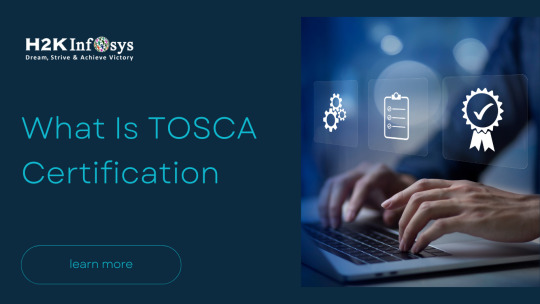
Tricentis offers various certifications, each catering to different levels of expertise. Below are the most recognized certifications:
1. Tricentis Certified Automation Specialist Level 1 & 2
Ideal for beginners.
Covers fundamental and intermediate automation concepts.
Includes hands-on exercises and scenario-based test automation.
2. Tricentis Certified Test Automation Engineer
Advanced certification for professionals with experience in automation.
Covers CI/CD integration, API testing, and advanced scripting techniques.
3. Tricentis Certified Test Architect
For experienced testers looking to design and implement automation frameworks.
Focuses on enterprise-level automation strategies.
4. Tricentis Certified DevOps Practitioner
Targets professionals integrating TOSCA in DevOps pipelines.
Covers continuous testing and deployment strategies.
5. Tricentis Certified Performance Engineer
Focuses on performance testing and optimizing test execution speed.
Each certification provides official recognition from Tricentis, enhancing your credibility as an automation expert.
How to Get Tricentis TOSCA Certified?
To obtain a Tricentis TOSCA Certification, follow these steps:
Step 1: Enroll in TOSCA Training Online
The first step is to complete a TOSCA Training Online course. Many training providers offer self-paced and instructor-led programs that cover:
TOSCA Basics & Installation
Test Case Design & Execution
Modules & Test Data Management
API Testing
CI/CD Pipeline Integration
Step 2: Gain Hands-On Experience
Practicing in a real-world testing environment is essential. You can:
Download Tricentis TOSCA Trial Version to practice test creation.
Work on automation projects in a sandbox environment.
Participate in online TOSCA communities to learn best practices.
Step 3: Register for the Certification Exam
Visit the Tricentis Academy website.
Choose the certification that matches your expertise.
Pay the exam fee (varies based on certification level).
Schedule your exam online.
Step 4: Take the Exam
The certification exam typically includes:
Multiple-choice questions covering theoretical concepts.
Practical assessments where you automate real-world scenarios using TOSCA.
Step 5: Get Certified and Apply Your Skills
After passing the exam, you will receive an official Tricentis certification. You can now showcase your certification on LinkedIn, resumes, and job applications to attract employers.
Real-World Applications of TOSCA Automation
To understand the impact of TOSCA, let’s explore some real-world use cases:
1. Banking Sector
A leading global bank implemented TOSCA to automate end-to-end transactions, reducing test execution time by 60% and minimizing human errors.
2. Healthcare Industry
A healthcare provider used TOSCA for regression testing of electronic health records (EHR), ensuring compliance with HIPAA regulations.
3. Retail & E-commerce
An e-commerce giant integrated TOSCA into its CI/CD pipeline, enabling faster deployments with automated checkout and payment process testing.
These case studies highlight how Testing Tool TOSCA improves efficiency and software quality across different industries.
Tips to Succeed in the TOSCA Certification Exam
To pass the TOSCA certification exam, follow these best practices:
✅ Understand Core Concepts
Learn model-based testing principles.
Understand test case design, execution, and reporting.
✅ Practice Hands-On Scenarios
Create automation scripts for web, mobile, and API testing.
Work on real-world projects to gain practical exposure.
✅ Join Online Communities
Engage with Tricentis forums, LinkedIn groups, and Slack communities.
Discuss challenges and solutions with experienced professionals.
✅ Use Official Study Materials
Access Tricentis Academy resources.
Review sample exam questions and mock tests.
Conclusion
Getting Tricentis TOSCA Certification is a game-changer for professionals aiming to excel in test automation. As businesses continue to adopt automation testing, Testing Tool TOSCA expertise is becoming a must-have skill. Enrolling in TOSCA Training Online equips you with practical knowledge to pass the certification and secure high-paying job opportunities.
Take the next step in your automation journey by enrolling in a TOSCA training program today and unlocking new career opportunities!
Ready to level up your skills? Dive into our ultimate resource: TOSCA Automation Tool: A Complete Guide.
0 notes
Text
Cloud Computing Tutorial for Beginners
Introduction Think of a world where you can use your files, run applications, or even write software without carrying around a high-end computer. That's cloud computing magic — a revolutionary technology that's redefining the manner in which we interact with computers and the web. Be a student, an entrepreneur, or a geek; learning cloud computing opens doors to endless possibilities. In this simple-to-get-start tutorial, we'll de-mystify what cloud computing is, how it works, the main models and services, and why it matters in today's digital age.
What is Cloud Computing? Cloud computing is the provision of computer services — including servers, storage, databases, networking, software, analytics, and intelligence — over the internet ("the cloud") to provide faster innovation, elastic resources, and economies of scale. In straightforward terms, rather than executing software or storing information on your local computer or server, you use a distant system that you access via the internet.
Key Features • On-demand self-service: Compute resources can be provisioned by end-users without human intervention. • Broad network access: Services are made available from anywhere on internet-enabled devices. • Pooling of resources: Cloud providers employ multi-tenant models to host several customers. • Rapid elasticity: Resources can be scaled up or down rapidly depending on demand. • Measured service: You only pay for what you use.
Why Cloud Computing? • Economical: No investment in costly hardware or infrastructure. • Scalable: Simply scale your resources as your needs expand or contract. • Reliable: Cloud providers offer strong disaster recovery and backup solutions. • Accessible: Work anytime, anywhere. • No maintenance: Cloud providers handle updates, security patches, and so forth.
Types of Cloud Deployment Models There are three primary deployment models in cloud computing: 1. Public Cloud • They are offered on the public internet and are used by numerous users. • Examples: Amazon Web Services (AWS), Microsoft Azure, Google Cloud Platform (GCP).
• Suitable for: Small and medium-sized businesses, start-ups, or individuals who need instant access to assets. 2. Private Cloud • Reserved for a single organization. • Either on-premises deployed or by a third-party provider. • Provides greater control and security but is expensive. 3. Hybrid Cloud • Ties public and private clouds together for greater flexibility. • Businesses can have sensitive data on a private cloud and use public cloud for less sensitive processes.
Cloud Service Models Cloud computing services are mostly classified into three models: 1. IaaS (Infrastructure as a Service) • Provides virtualized computing resources over the internet. • You control the operating system, applications, and data. • Example: AWS EC2, Google Compute Engine. Usage: Storing web site hosting, running virtual machine executions, and backup data storage.
2. PaaS (Platform as a Service) • Provides a platform to customers to write, run, and host applications without the burden of infrastructure management. • Example: Google App Engine, Heroku. Use case: Developing apps fast without worrying about the hardware or operating system. 3. SaaS (Software as a Service) • Delivers software applications over the internet on a subscription model. • Example: Google Workspace, Microsoft 365, Dropbox. Use case: Having access to software like email, file storage, or CRM without installing it locally. Real-World Examples •Netflix uses AWS to provide videos to hundreds of millions of customers across the globe. •Dropbox allows users to save and share documents through cloud storage. •Salesforce offers a cloud-based CRM application to manage business relationships. •Zoom hosts its video conferencing website on the cloud with high availability. Main Cloud Providers Some of these companies own the marketplace in the cloud: •Amazon Web Services (AWS): Most used and veteran cloud platform. •Microsoft Azure: Biggest in hybrid cloud and enterprise cloud. •Google Cloud Platform (GCP): Focused on data analytics and machine learning. •IBM Cloud, Oracle Cloud, Alibaba Cloud: Other prominent ones. Everyone provides similar essential services but differing tools and cost structures.
Getting Started with Cloud Computing Follows is a step-by-step way in which you can begin to try cloud computing as a beginner: Step 1: Sign Up for a Free Tier Free tiers are provided by all the big cloud providers. For instance: • tAWS Free Tier provides EC2, S3, Lambda, etc. • tAzure Free Account provides $200 credits. • tGoogle Cloud Free Tier provides Compute Engine and BigQuery. Step 2: Explore Basic Services • Install a Virtual Machine (VM): Start a minimal server using EC2 (AWS) or Compute Engine (GCP). • Install Cloud Storage: Store data in S3 (AWS) or Google Cloud Storage. • Test a SaaS App: Mess around with applications such as Google Docs or Trello. Step 3: Learn by Projects Mess around with small projects such as: • Serving a static web page. • Creating a to-do application with Firebase. • Hosting a chatbot on Azure.
Step 4: Study and Certify Cloud certifications can give your career a boost: • AWS Certified Cloud Practitioner • Microsoft Certified: Azure Fundamentals • Google Cloud Digital Leader These beginner certifications prove your grasp of cloud concepts.
Security in Cloud Security is top of the mind for cloud computing. Even as providers put huge investments in security, end users have some responsibilities too. Shared Responsibility Model: •Cloud provider secures infrastructure. •Customer secures user access, data, and application-level settings. Key Practices: •Employ strong authentication (e.g., multi-factor). •Encrypt data in transit and at rest. •Monitor activity on a regular basis and audit it. •Set proper permissions on users.
Challenges of Cloud Computing The cloud is wonderful, but it's not all sunshine: •Downtime: Disruptions may occur in accessing essential services. •Vendor Lock-in: It is complicated and costly to switch vendors. •Security Risks: Erroneous configuration can compromise security. •Cost Overruns: Pay-as-you-go arrangements become prohibitively expensive if left unmonitored. It's great to be aware of these challenges in order to make smart decisions. The Future of Cloud Computing Cloud computing just keeps improving with fascinating trends such as: •Serverless computing: Code is the focus for developers, while the infrastructure is handled by the provider. •Edge computing: Processing data close to the source (e.g., IoT devices) for enhanced performance. •AI and ML Integration: Cloud platforms allow for powerful tools for model training and deployment. •Multi-cloud strategies: Organizations use multiple providers to avoid dependence on a sole one. Final Thoughts Cloud computing is not a fad buzzword — it's actually the backbone of contemporary digital life. Whether streaming entertainment and smart homes or business applications and mobile phones, the cloud permeates nearly all aspects of everyday life. By learning the basics now, you're setting yourself up to take advantage of one of the greatest technology shifts of the 21st century. If you love development, data, or infrastructure, the cloud has something for you.
0 notes